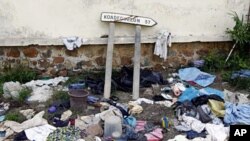The International Criminal Court is in Ivory Coast to investigate war crimes committed during the political crisis between the former government and the winner of last year's vote.
President Alassane Ouattara's government signed an agreement with the criminal court allowing it to formally open an investigation into crimes committed during the political violence that followed then-president Laurent Gbagbo refusing to allow Mr. Ouattara to take power.
Justice Minister Jeannot Ahoussou Kouadio met with the International Criminal Court's deputy prosecutor Fatou Bensouda. Kouadio says the agreement shows the Ouattara government's commitment to ensuring that anyone who committed crimes faces justice, regardless of who they backed during the crisis.
The justice minister says Prosecutor Bensouda's presence in Abidjan is a powerful signal that no one can commit a crime without being found out and punished.
The criminal court's chief prosecutor Luis Moreno-Ocampo says at least 3,000 people were killed during the political crisis that ended with Mr. Gbagbo's capture in an underground bunker. The court says 520 people were arbitrarily detained and there were more than 100 reported cases of rape.
Deputy prosecutor Bensouda says ICC investigators will work closely with their Ivorian counterparts.
"The ICC only comes in to complement what the national efforts that are taking place and we believe that with this co-operation between the Ivorian authorities and the office of the prosecutor of the ICC we can assist to put an end to impunity," said Bensouda.
Mr. Gbagbo and his wife are under house arrest near the Burkinabe border. The Ouattara government says it intends to try them for crimes against the Ivorian people including corruption and embezzlement.
Human Rights Watch says members of Mr. Gbagbo's youth wing killed Ouattara supporters in Abidjan and attacked immigrants from countries thought to support Mr. Ouattara. The group says former rebels who helped bring Mr. Ouattara to power are guilty of revenge attacks both in Abidjan and near the Liberian border.




